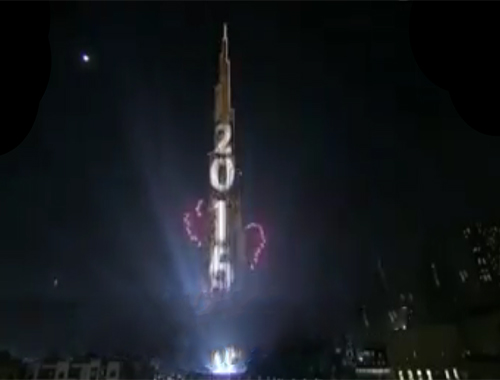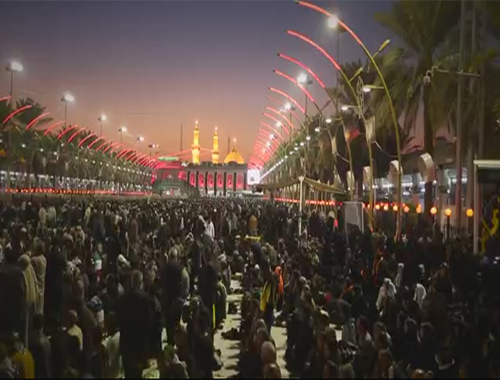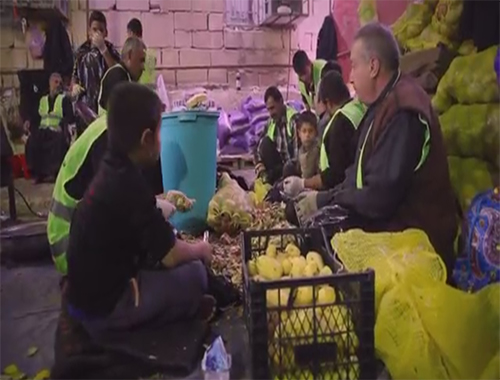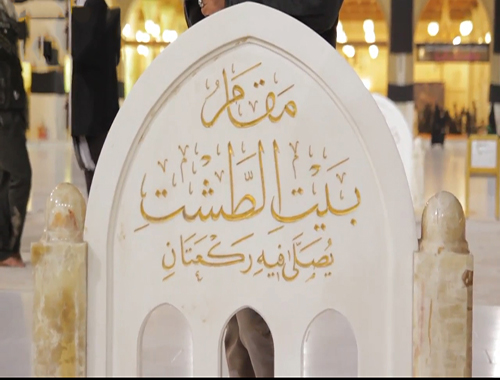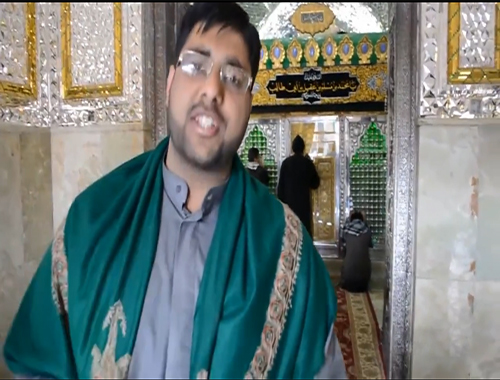verse55
- Details
- Hits: 2336
(55) إِنَّمَا وَلِيُّكُمُ اللّهُ وَرَسُولُهُ وَالَّذِينَ آمَنُواْ الَّذِينَ يُقِيمُونَ الصَّلوةَ وَيُؤْتُونَ الزَّكَوةَ وَهُمْ رَاكِعُونَ
55. " Verily, verily your guardian ( Waliyy) is only Allah and His Messenger and those who believe, those who establish prayer and pay the poor-rate while bowing down (in prayer). "
Commentary:
It has been cited in the occasion of revelation of the above verse that: a beggar entered the Mosque of the Messenger of Allah (p.b.u.h.) and asked people for a charity. No one gave him any thing. Ali-Ibn-Abi-Talib (a.s.) pointed his finger to him while he was bowing in the prayer, and he (a.s.) remitted his ring to that beggar. In honouring of this remital, the above verse was revealed.
The explanation of the above event has been narrated by ten people from among the companions of the Prophet (p.b.u.h.), like: Ibn-Abbas, 'Ammar, Jabir-ibn- 'Abdillah, 'Abuthar, 'Anas-ibn-Malik, Bilal, and so on. The scholars of both schools of Sunni and Shi'ah have confirmed this occasion of revelation.
'Ammar-Yasir says that it was after the remital of the ring and the revelation of the holy verse that the Messenger of Allah (p.b.u.h.) said:
" The one upon whom I am master, then this Ali is his master. "(Al-Mizan)
The holy Prophet (p.b.u.h.) recited this verse in Qadir-i-Khum in order to state the position of Hadrat Ali (a.s.). (As-Safi)
Ali-ibn-Abitalib (a.s.) himself repeatedly recited this verse for his own rightfulness. (As-Safi).
'Abuthar, who himself witnessed the event, explained what occarred for the people in details in the Sacred Mosque. (Majma'-ul-Bayan). Almost all the authentic commentary books, compiled by both Sunni and Shi'ah commentators, have recorded the event.
The term /waliyy/, mentioned in this verse, does not mean ' friend ' and ' helper ' here, since friendship and helping refers to all the Muslims, not to those who give charity while bowing down in prayer. According to the Islamic traditions, the purpose of it is only Ali-ibn-Abitalib (a.s.), and the application of the plural form of the verb / ,amanu / for a singular subject is for the importance of the one. A similar case is found in the verse of ' mutal cursing ' where it says / 'anfusana wa 'anfusakum / (ourselves and yourselves)
In the meantime, many Islamic scholars and the commentators of the Qur'an have said that the objective meaning of the word / waliyy /, mentioned in the above verse, is / Wilayah / in the sense of: ' guadianship ' and ' material and spiritual personal initiative ' and ' leadership '. In particular that this guardianship has been ordered in the same row of the guardianship of the Prophet (p.b.u.h.) and the guardianship of Allah, and these three are stated in one sentence.
Thus, this verse is one the verses that, as a Qur'anic text, indicate to mastership and Imamate of Ali-ibn-Abitalib (a.s.).
Explanations:
1. Islam is the religion of both association and disassociation, i.e. attraction and repulsion (polarization).
In the previous verses, the Jews and the Christians were prohibited to be chosen as masters. Here, in this verse, the commad ment is that we take and follow Allah (s.w.t.), the Messenger (p.b.u.h.), and Ali (a.s.) as our masters.
2. The essence of mastership of Allah, the Messenger, and Hadrat Ali (a.s.) is the same, and it is essentially one in nature as well as in effect. That is why the verse says : / Waliyyukum / (your guardian) in a singular form, not / 'aulia'ukum / (your guardians) in plural form.
3. The terms of prayer and alms-tax (charity) are usually mentioned in the Qur'an beside each other, but, in this verse, they are mixed with together, (giving alms-tax while bowing down in prayer).
4. Those who are not among the performers of prayer and alms-tax have not the right of guardianship and leadership over people.
5. In order to help the deprives, they do not consider even their prayer as a barrier. The mass of Muslims should not be inattended to a poor so that he leaves them dejected and disappointed.
6. Heeding the created beings, in the cause of Allah, does not harm the sincerity. (Alms-tax while bowing down)
(People minus Allah is Marksism, and Allah minus people is monasticism, but people alongside the path of Allah is the method of Islam.)
7. The person who is inattentive to the sigh of the poor should not be your leader and your guardian.
8. Some particular insignificant things (like charity) do not invalidate prayer.
9. The Qur'an has counted the freewill offering (recommendable charity) and the ring even as poor-rate.
" ... and pay the poor-rate ..."
10. Guardianship over Muslims belongs: firstly to Allah (s.w.t.), secondly to the Prophet (p.b.u.h.), and then to the Immaculate Imam and after that to jurisconsult.
11. The best kind of introduction is that in which the qualities and characteristics of a particular person be mentioned and the audience adapt them to its aspect and they themselves find its extention. (the verse, without mentioning the name of Ali, has enumerated his qualities and actions.)
" Verily, verily your guardian ( Waliyy) is only Allah and His Messenger and those who believe, those who establish prayer and pay the poor-rate while bowing down (in prayer). "


